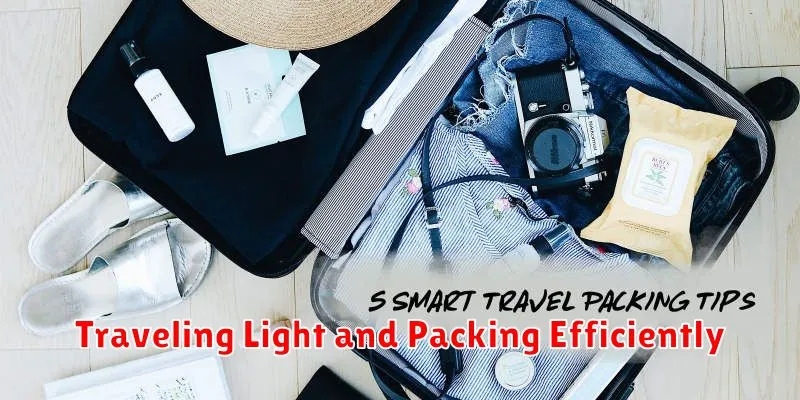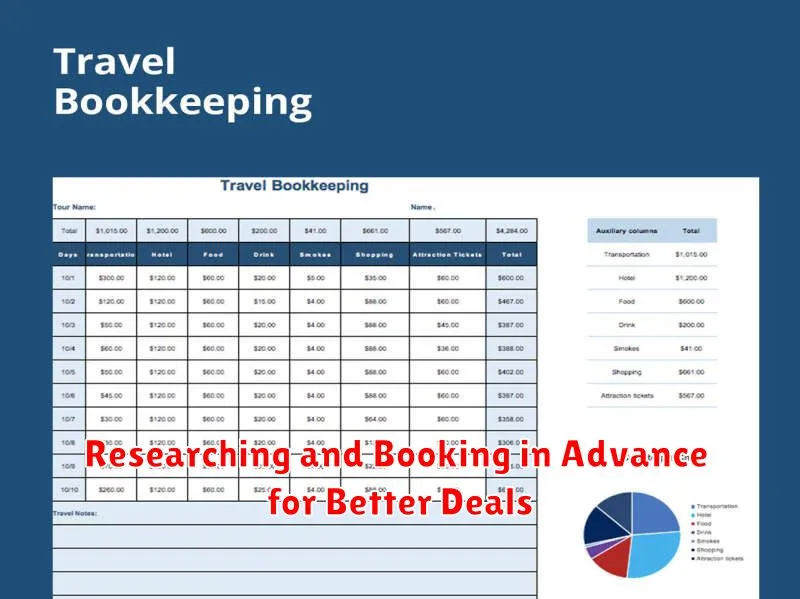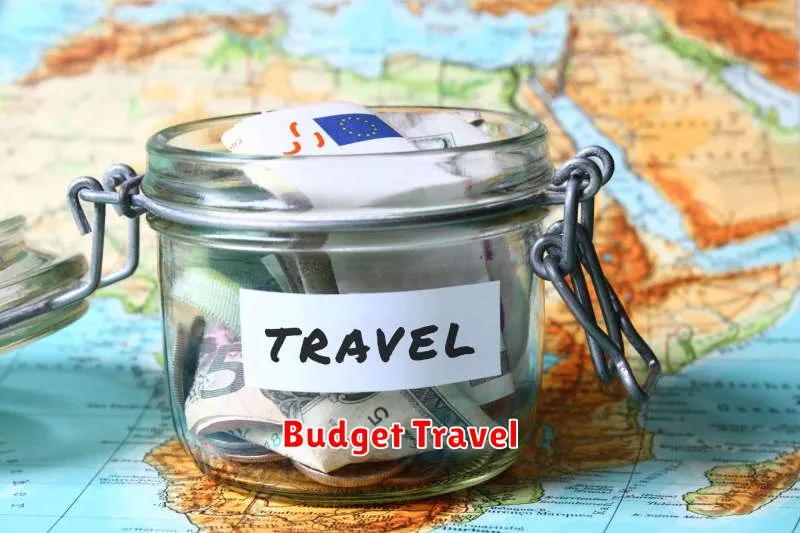Dreaming of a getaway but feeling the sting of travel costs? You’re not alone. With rising inflation, vacations can seem like a luxury we can’t afford. But don’t despair! There are plenty of ways to save money on travel and vacations without sacrificing the fun. This guide will equip you with the tools and strategies to turn your travel dreams into reality, so you can experience the world without breaking the bank.
From planning your trip on a budget to leveraging travel rewards and finding hidden gems, we’ll explore effective strategies to maximize your travel dollars. Whether you’re a seasoned traveler or a first-timer, this article will provide valuable tips to help you make the most of your next adventure. Get ready to unlock the secrets of budget travel and discover how to save money on every aspect of your vacation.
Setting a Realistic Travel Budget and Sticking to It
The first step to saving money on travel is setting a realistic budget. This means considering all of your expenses, including flights, accommodation, food, activities, and transportation. It’s important to be honest with yourself about how much you can afford to spend and not overestimate your budget. A great way to stay on track is to use a budgeting app or spreadsheet to keep track of your spending.
Once you’ve established a budget, it’s important to stick to it. This can be challenging, especially when you’re on vacation and tempted to splurge. But, it’s important to remember that every dollar you save on travel is a dollar you can spend on other things you enjoy.
Here are a few tips for sticking to your travel budget:
- Pack light: This will help you save money on baggage fees and avoid having to buy extra clothes while you’re away.
- Eat at local restaurants: This is a great way to experience the local culture and save money on meals.
- Take advantage of free activities: Many destinations offer free activities, such as museums, parks, and hiking trails.
- Bring your own snacks and drinks: This is a great way to save money on food and drinks, especially if you’re traveling with kids.
- Use public transportation: This is often cheaper than taxis or rental cars.
By following these tips, you can save money on travel and still have a great time.
Traveling During the Off-Season or Shoulder Season
One of the most effective ways to save money on travel is to travel during the off-season or shoulder season. These periods are the times of year when fewer people travel, resulting in lower prices for flights, hotels, and other travel expenses.
The off-season typically refers to the least popular time to visit a destination, often during the winter months or the rainy season. The shoulder season is the time between the peak season and the off-season, usually during the spring and fall. These periods often offer a balance between favorable weather conditions and lower prices.
By traveling during these less popular times, you can enjoy many benefits, including:
- Lower flight prices
- Lower hotel prices
- Less crowded attractions
- More personalized attention from local businesses
While traveling during the off-season or shoulder season may require a bit more planning, it’s a fantastic way to save money on your travel expenses without sacrificing the quality of your experience.
Finding Affordable Accommodation Options (Hostels, Airbnb, etc.)
When it comes to traveling on a budget, accommodation is one of the biggest expenses. Luckily, there are plenty of affordable options available, making it possible to explore the world without breaking the bank. Here are a few popular choices:
Hostels are a great option for solo travelers and budget-conscious groups. Hostels offer shared rooms with bunk beds, often with communal bathrooms and kitchens. You’ll be surrounded by fellow travelers, making it an excellent place to meet new people and exchange tips.
Airbnb has become a popular alternative to traditional hotels, offering a wide range of accommodation options, from private rooms to entire apartments. You can often find deals on Airbnb, especially if you book in advance or stay for longer periods. The advantage of Airbnb is that you can experience living like a local, with access to a kitchen and laundry facilities.
Couchsurfing is a website and app that connects travelers with locals willing to host them for free. Couchsurfing is a fantastic way to meet people and experience a city from a local perspective. Remember, it’s a reciprocal system, so you’ll likely be expected to host travelers in your home someday.
Camping is an incredibly budget-friendly option, especially if you have your own gear. National parks and campgrounds often have affordable camping sites, allowing you to enjoy nature and immerse yourself in the outdoors.
No matter your travel style, there’s an affordable accommodation option out there for you. By considering these options, you can free up your budget to enjoy other aspects of your vacation, like exploring new places and trying local cuisine.
Utilizing Travel Search Engines and Comparing Prices
One of the most effective ways to save money on travel is by utilizing travel search engines and comparing prices. These websites act as aggregators, collecting data from various airlines, hotels, and car rental companies, presenting you with a comprehensive list of options. This allows you to compare prices across different providers and potentially find significant savings.
Popular travel search engines include Kayak, Google Flights, Skyscanner, and Expedia. Each platform has its strengths and weaknesses, so it’s beneficial to use multiple engines to ensure you’re getting the best deals. For example, Kayak is known for its “Explore” feature, which allows you to search for flights to various destinations within a specific budget, while Google Flights excels at finding the cheapest dates for your desired route.
When using these engines, be flexible with your travel dates and destinations. Being open to alternative dates or exploring nearby airports can lead to substantial savings. Remember to consider all fees and charges, such as baggage fees, seat selection fees, and airport taxes, before making a final decision.
In addition to searching for flights, these engines often offer deals on hotels and rental cars. Comparing prices and reading reviews can help you find the best value for your money. Don’t forget to check for promotional codes and discounts, which can be found on websites like RetailMeNot or Groupon.
By taking advantage of travel search engines and actively comparing prices, you can significantly reduce your travel expenses and enjoy a more affordable vacation.
Taking Advantage of Free Activities and Attractions
Traveling can be expensive, but there are plenty of ways to save money without sacrificing fun. One of the best ways to do this is by taking advantage of free activities and attractions. Many destinations offer a wealth of free things to see and do, from exploring parks and museums to attending concerts and festivals.
Start by researching free or low-cost attractions in your destination. Many cities offer free walking tours, where you can learn about local history and culture. Museums often have free days or discounted admission during certain hours. You can also find free events and festivals listed online or in local publications.
Don’t forget about nature’s free attractions. Parks, beaches, and hiking trails are great ways to enjoy the outdoors without spending money. Many cities also offer free public transportation or bike-sharing programs. These can be excellent ways to explore your destination without worrying about parking or taxi fares.
Remember to always check for deals and discounts. Many museums and attractions offer discounts for students, seniors, and families. You can also find coupons and promo codes online or in travel magazines. By taking advantage of free activities and attractions, you can make your trip more budget-friendly and create lasting memories.
Eating Like a Local: Exploring Affordable Dining Options
One of the most significant expenses on any trip is food. But, it doesn’t have to break the bank. Instead of opting for tourist traps and fancy restaurants, consider eating like a local to save money and experience the authentic flavors of your destination.
Here are some tips to explore affordable dining options:
Embrace Street Food
Street food is not only budget-friendly but also a fantastic way to sample local delicacies. From steaming bowls of noodles in Asia to mouthwatering tacos in Mexico, street vendors offer a delicious and affordable way to eat. Be sure to look for vendors with a long line – it’s a good indicator of quality and popularity.
Explore Local Markets
Many cities have vibrant local markets where you can buy fresh produce, meats, and cheeses. Pick up some ingredients and prepare your own meals in your hotel room or rental apartment. This can significantly reduce your food costs, especially if you are traveling with a group.
Dine at Local Eateries
Step away from tourist hotspots and seek out local eateries. These restaurants often offer delicious meals at a fraction of the price of tourist-oriented establishments. Ask locals for recommendations or check online reviews for authentic and budget-friendly options.
Take Advantage of Happy Hour
Happy hour specials can be a great way to save on drinks and snacks. Many bars and restaurants offer discounted appetizers and drinks during specific times, allowing you to enjoy a relaxing meal without breaking the bank.
Utilize Discount Apps and Websites
There are numerous apps and websites designed to help travelers find deals on food. Look for apps like Groupon, Yelp, and TripAdvisor to find discounts on restaurants and food experiences.
Eating like a local can be a rewarding experience. It allows you to immerse yourself in the local culture, discover hidden culinary gems, and save money on your trip. By following these tips, you can enjoy delicious meals without exceeding your budget.
Packing Smart to Avoid Extra Baggage Fees
One of the most dreaded aspects of travel, especially for budget-conscious travelers, is the potential for hefty baggage fees. Airlines have become increasingly strict with their baggage policies, and exceeding weight or size limits can lead to unexpected costs that quickly add up. Luckily, packing smart can help you avoid these fees and keep your travel budget on track.
Before you even start packing, research your airline’s baggage allowance. Familiarize yourself with the weight and size restrictions for both carry-on and checked luggage. You can usually find this information on the airline’s website or by contacting them directly.
Pack strategically. Prioritize essential items and leave behind anything that isn’t absolutely necessary. Choose versatile clothing items that can be mixed and matched to create multiple outfits. Opt for lightweight fabrics like cotton and linen, which take up less space in your luggage.
Maximize space. Roll your clothes instead of folding them to save space and prevent wrinkles. Utilize packing cubes to organize your belongings and compress them into a smaller footprint. Don’t be afraid to wear your bulkiest items on the plane to minimize what you need to pack.
Travel light. If possible, consider traveling with only a carry-on bag. This will not only save you on baggage fees, but it will also make navigating airports much easier and faster. If you must check a bag, aim to stay within the weight and size limits to avoid any unexpected fees.
By following these tips, you can pack smart, avoid extra baggage fees, and keep more money in your pocket for the exciting activities and experiences that await you on your trip.
Considering Alternative Modes of Transportation
While flying is often the quickest way to get to your destination, it can also be the most expensive. Considering alternative modes of transportation, like trains and buses, can save you a significant amount of money. Many train and bus lines offer discounts for advance purchases and group travel, making them even more budget-friendly. Plus, you might get to enjoy beautiful scenery along the way, something you wouldn’t get on a plane!
Carpooling is another great option, especially for shorter distances. You can split the gas and tolls with other passengers, and you might even meet some new people. If you’re comfortable with driving a car, renting a car can be a convenient and affordable option for exploring a new area. Just make sure to factor in the cost of gas and parking.
Don’t forget about the good ol’ fashioned road trip! If you have the time, driving can be a fun and economical way to travel. You can stop and see the sights along the way, and you’re not limited to a set schedule. Remember to plan your route, pack snacks, and make sure your car is in good working order.
Utilizing Travel Rewards Programs and Credit Card Points
One of the most effective ways to save money on travel is to leverage travel rewards programs and credit card points. Many airlines and hotels offer loyalty programs that allow you to earn points for your purchases and redeem them for flights, hotel stays, upgrades, and other travel-related perks.
Credit cards are a powerful tool for accumulating points quickly. Choose a credit card that offers generous rewards for travel spending, such as bonus points for airline tickets or hotel stays. Be sure to pay your balance in full each month to avoid interest charges.
Travel rewards programs are designed to incentivize repeat business. Sign up for programs offered by the airlines and hotels you frequent. Look for opportunities to earn bonus points through promotions and partnerships. Remember to track your points and use them before they expire.
Transferring points between different programs can maximize your rewards. Some credit cards offer the ability to transfer points to airline and hotel loyalty programs, allowing you to choose the best redemption option.
Traveling Light and Packing Efficiently

Packing light is one of the easiest ways to save money on travel. The less you bring, the less you’ll have to pay for baggage fees and the easier it will be to navigate airports and train stations. Start by choosing a smaller suitcase or backpack, then prioritize the essentials.
Use packing cubes to compress your clothes and keep your bag organized. These cubes can help you fit more into your bag and make unpacking easier. Remember, you can always buy essentials like toiletries and adapters at your destination. Choose versatile clothing that can be mixed and matched, and consider packing items that have multiple uses, such as a scarf that can be worn as a shawl, blanket, or head covering.
Pack for the activities you plan to do. If you’re going on a hiking trip, you’ll need different gear than if you’re going to a beach vacation. Before you leave, make a list of everything you think you’ll need and then start eliminating items that aren’t essential. You can also try the “one-week rule”. If you haven’t worn an item in the past week, consider leaving it at home.
Packing efficiently can save you money on baggage fees, make your travel experience more comfortable, and reduce your overall travel costs. With a little planning and preparation, you can travel light and still enjoy your trip to the fullest.
Researching and Booking in Advance for Better Deals

One of the most effective ways to save money on travel is to research and book in advance. This applies to flights, accommodations, and even activities. Airlines and hotels often offer discounted rates for early bookings, especially during off-season or less popular travel periods. By planning ahead, you can secure the best deals and avoid last-minute price hikes.
Utilize online travel search engines and comparison websites to compare prices across various airlines, hotels, and travel agencies. Many of these platforms provide calendar views that allow you to see price fluctuations across different dates, helping you identify the most cost-effective time to travel. Don’t hesitate to set price alerts for your desired destinations, so you’re notified when fares drop.
Booking accommodations in advance can be particularly advantageous, as hotels often release limited rooms at discounted rates. Additionally, consider booking packages that combine flights, accommodations, and sometimes even car rentals or activities, as these packages can offer significant savings compared to booking each element individually. Remember to factor in any potential cancellation policies or fees when booking in advance.

